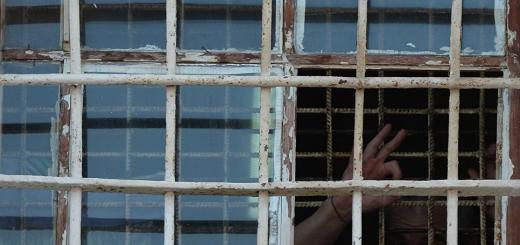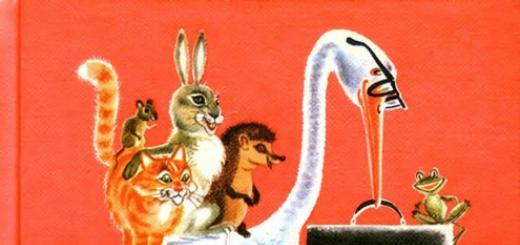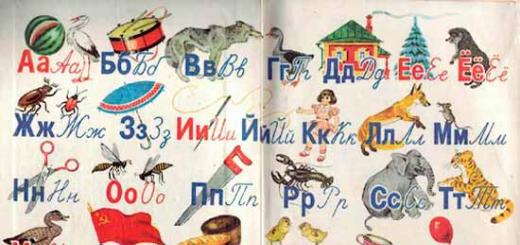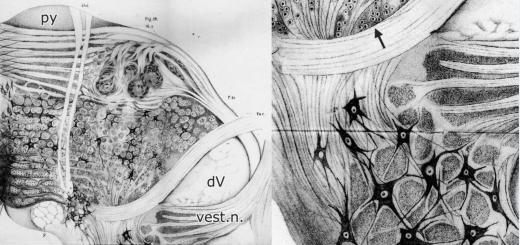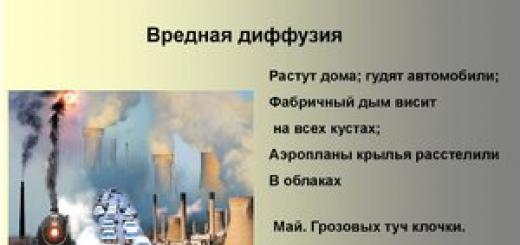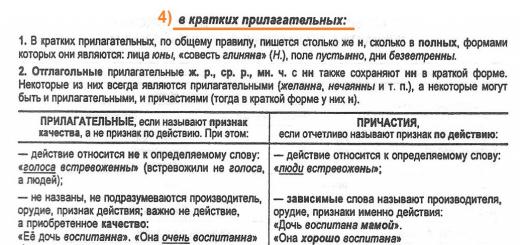Mayakovsky's work remains to this day an outstanding artistic achievement of early Russian poetry. XX century His works are not devoid of ideological distortions and propaganda rhetoric, but they cannot erase the objective significance and scale of Mayakovsky’s artistic talent, the reformist essence of his poetic experiments, which for his contemporaries, and even for the poet’s descendants, were associated with a revolution in art.
Mayakovsky was born in Georgia, where he spent his childhood. After the death of his father in 1906, the family moved to Moscow, where Mayakovsky entered the 4th grade of the Fifth Moscow Gymnasium. In 1908, he was expelled from there, and a month later Mayakovsky was arrested by the police in the underground printing house of the Moscow Committee of the RSDLP. Over the next year he was arrested twice more. In 1910-1911, Mayakovsky studied in the studio of the artist P. Kelin, and then studied at the School of Painting, met the artist and poet D. Burliuk, under whose influence Mayakovsky’s avant-garde aesthetic tastes were formed.
Mayakovsky wrote his first poems in 1909 in prison, to which he came through connections with underground revolutionary organizations. The debut poet's poems were written in a rather traditional manner, which imitated the poetry of Russian symbolists, and M. himself immediately abandoned them. A real poetic baptism for M. was his acquaintance in 1911 with the futurist poets. In 1912, M., together with other futurists, issued the almanac “A Slap in the Face of Public Taste” (“A Slap in the Face of Public Taste”), signed by D. Burliuk, O. Kruchenykh and V. Mayakovsky. With Mayakovsky's poems "Noch" ("Night") and "Utro" ("Morning"), in which in a shockingly daring manner he proclaimed a break with the traditions of Russian classics, he called for the creation of a new language and literature, one that would meet the spirit of modern " machines" of civilization and the tasks of revolutionary transformation of the world. The practical embodiment of the futuristic theses declared by Mayakovsky in the almanac was the constant production at the St. Petersburg Luna Park Theater in 1913 of his poetic tragedy “Vladimir M.” (“Vladimir M.”). The author personally acted as director and performer of the main role - a poet who suffers in a modern city that he hates, which cripples the souls of people who, although they elect the poet as their prince, are not able to appreciate the sacrifice he made. In 1913, Mayakovsky, together with other futurists, carried out a large tour of the cities of the USSR: Simferopol, Sevastopol, Kerch, Odessa, Chisinau, Nikolaev, Kiev, Minsk, Kazan, Penza, Rostov, Saratov, Tiflis, Baku. The futurists did not limit themselves to the artistic interpretation of the program of new art and tried to introduce their slogans into life practically, in particular even through clothing and behavior. Their poetic performances, visits to coffee shops, or even an ordinary walk around the city were often accompanied by scandals, brawls, and police intervention.
Under the sign of passion for the futuristic slogans of the restructuring of the world and art is the entire work of M. of the pre-revolutionary period; it is characterized by the pathos of objections to bourgeois reality, which, according to the poet, morally cripples a person, awareness of the tragedy of human existence in the world of profit, calls for a revolutionary renewal of the world: poems “ The Hell of the City" ("Hell of the City", 1913), "Here!" (“Nate!”, 1913), collection “I” (1913), poems “Cloud in Pants” (“Cloud in Pants”, 1915), “Flute-Spine” (“Flute-Spine”, 1915), “War and peace" ("War and Peace", 1916), "Man" ("Man", 1916), etc. The poet sharply objected to the First World War, which he characterized as a senseless bloodbath: the article "Civil Shrapnel" (State Shrapnel, 1914), the verse “War has been declared” (“War has been declared”, 1914), (“Mom and the evening killed by the Germans”, 1914), etc. With sarcastic irony, the poet refers to the hypocritical world of bureaucrats, careerists who discredit honest work, a clear conscience and high art: (“Hymn to the Judge”, 1915), “Hymn to the Scientist” (“Hymn to the Scientist”, 1915), “Hymn to the Habar” (“Hymn to the Bribe”, 1915), etc.
The pinnacle of Mayakovsky’s pre-revolutionary creativity is the poem “A Cloud in Pants,” which became a kind of programmatic work of the poet, in which he most clearly and expressively outlined his ideological and aesthetic principles. In the poem, which the poet himself called “the catechism of modern art,” four slogans are proclaimed and concretized in figurative form: “Away with your love,” “away with your order,” “away with your art,” “away with your religion” - “four cries of four parts." The cross-cutting leitmotif running through the entire poem is the image of a man who suffers from the incompleteness and hypocrisy of the existence that surrounds him, who protests and strives for real human happiness. The initial title of the poem - “The Thirteenth Apostle” - was crossed out by censorship, but it is precisely this that more deeply and accurately conveys the main pathos of this work and all of Mayakovsky’s early work. The Apostle is the teachings of Christ, called upon to implement his teachings in life, but in M. this image quickly approaches the one that will later appear in O. Blok’s famous poem “The Twelve.” Twelve is the traditional number of Christ’s closest disciples, and the appearance in this series of the thirteenth, “superfluous” apostle to the biblical canons, is perceived as a challenge to the traditional universe, as an alternative model of a new worldview. Mayakovsky's thirteenth apostle is both a symbol of the revolutionary renewal of life that the poet strived for, and at the same time a metaphor capable of conveying the true scale of the poetic phenomenon of the speaker of the new world - Mayakovsky.
Mayakovsky's poetry of that time gives rise not just to individual problems and shortcomings of modern society, it gives rise to the very possibility of its existence, the fundamental, fundamental principles of its existence, acquires the scale of a cosmic rebellion in which the poet feels himself equal to God. Therefore, in their desires, the anti-traditionality of Mayakovsky’s lyrical hero was emphasized. It reached the maximum level of shocking, so much so that they seemed to give a “slap in the face to public taste”, demanded that the hairdresser “comb his ear” (“I didn’t understand anything...”), squat down and bark like a dog (“That’s how I am.” became a dog... ") and defiantly declares: “I love watching children die...” (“I”), throws at the audience during the performance: “I will laugh and joyfully spit, I will spit in your face.. .” (“Here!”). Together with Mayakovsky’s tall stature and loud voice, all this created a unique image of a poet-fighter, an apostle-harbinger of a new world. “The poetics of early Mayakovsky,” writes O. Myasnikov, “is the poetics of the grandiose.
In his poetry of those years, everything is extremely tense. His lyrical hero feels capable and obligated to solve not only the problems of rebuilding his own soul, but also of all humanity, the task is not only earthly, but also cosmic. Hyperbolization and complex metaphorization are characteristic features of the early Mayakovsky style. The lyrical hero of early Mayakovsky feels extremely uncomfortable in the bourgeois-philistine environment. He hates and disdains everyone who prevents the Capital Letter Man from living like a human being. The problem of humanism is one of the central problems of early Mayakovsky.
Sections: Literature
Subject. V. Mayakovsky. Life, creativity, personality of the poet. Pre-October creativity. Mayakovsky in Armavir.
Lesson objectives:
- get acquainted with the unknown pages of the biography, the personality and early work of V. Mayakovsky, the innovation of his lyrics, remember what was previously studied about the poet;
- develop students’ speech, creative abilities, and ability to analyze poems;
- cultivate interest in literature and history of one’s native country, native city, love for one’s native word.
Lesson form: lesson - role-playing game using multimedia.
Equipment for the lesson:
the lesson is held in a computer class, slides of photographs of V. Mayakovsky, his family, friends, the texts of his poems, a recording of the reading of poems by the author himself and famous artists, pages of the poet’s stay in Armavir are displayed on the screen.
DURING THE CLASSES
Epigraph
I will tell you about time and myself...
And I feel that “I” is not enough for me.
Someone breaks out of me stubbornly.
V. Mayakovsky
1. Introductory speech by the teacher.
Mayakovsky's work has always been the subject of heated debate. These disputes are not only of a narrow literary nature - we are talking about the relationship between art and reality, about the place of the poet in life. Mayakovsky lived a complex life, never ran away from life, from his youth he created and remade this life. Mayakovsky is one of the brightest names in the literature of the 20th century.
A lot has been written about Mayakovsky. Opinions about him are often polar. In front of you are pieces of paper with three statements about Mayakovsky. Let's get to know them.
Reading statements about Mayakovsky. (Annex 1)
Do not rush to agree with any opinion, first listen to the lesson material and then draw a conclusion.
Now let's remember who wrote these lines.
Baby son
came to my father
and the little one asked:
- What's happened
Fine
and what is
Badly?
Everyone knows these lines from childhood. This is V. Mayakovsky. It turns out that we have been familiar with his work since early childhood. Today we will learn new pages of the poet’s life and work, the personality of the poet, remember what we have previously studied, read his early works, and learn about Mayakovsky’s stay in our city.
The epigraph to the lesson will be the words of V. Mayakovsky “I myself will talk about time and myself...”. And one more line: “And I feel that “I” is not enough for me. Some people are stubbornly breaking out of me.” During the lesson you will hear lines from the biography of the poet written by Mayakovsky himself, which is called “I Myself.” This “I” rushing out is impossible not to notice in his autobiography.
Today's lesson is a role-playing game in the form of a round table. The creative group received the task in advance to study the life, work and personality of V. Mayakovsky. And now they will present us with the result of their work. At the round table we will have a literary scholar, a critic, correspondents, relatives and acquaintances of V. Mayakovsky. The main guest is the poet himself.
All students keep the necessary notes during the lesson in order to present a report on the work of the round table at the end of the lesson. On the table, everyone has a form with questions that must be filled out by the end of the lesson. Anyone can ask our guest additional questions.
So, let's begin our round table meeting. Your questions.
2. Round table meeting.
Correspondent for the newspaper Izvestia. It is known that you were born on July 7, 1893 in the village of Baghdad, Kutaisi province, Georgia. Your father is Vladimir Konstantinovich, a forester. Mother - Alexandra Alekseevna. Two sisters - Olga and Luda. Tell us about your family, about your childhood.
Mayakovsky. The family belonged to the noble class, but they lived in very modest incomes. The free spirit of the Caucasus, friendship and entertainment with Georgian children, trips with his father to the forestry contributed to early maturation and independence.
To study at the gymnasium, the family had to move to Kutaisi. I studied well and made new friends.
But the time came for 1905. Unrest broke out almost all over Russia, including in Kutaisi. Together with high school students, I took part in demonstrations and performances.
But soon an event occurred in our family that radically changed our lives: on February 19, 1906, our father died from blood poisoning. And in the summer the family moved to Moscow. We lived on our father’s pension, rented an apartment and rented out rooms.
The rooms that the family rented out were occupied by revolutionary students. They gathered friends and had conversations and debates on political topics. I listened to them, then asked them to read “something revolutionary.” They began to accept me as one of their own and even entrusted me with some illegal work.
Things didn't go well at the gymnasium. I became increasingly involved in communication with revolutionary youth. And at the beginning of 1908 I left the gymnasium.
Correspondent for the newspaper Trud. When did you first try to write?
Mayakovsky. In high school I tried to write. Others write, but I can’t?! It began to creak. It turned out incredibly revolutionary and equally ugly. I don't remember a single line. I wrote the second one. It came out lyrical. Not considering this state of heart compatible with my “socialist dignity,” I quit altogether.
Correspondent for the newspaper Trud. It is known that you were arrested several times during these years. Why and how did this influence the formation of your worldview?
Mayakovsky. 1908, I was 14 years old - I joined the RSDLP party. Then he began illegal activities in a printing house, for which he was arrested. When he was arrested, he was eating a bound notebook with addresses.
Surveillance, communication with professional revolutionaries, reading Marxist literature, more arrests.
In 11 Butyrka months I read everything new. Symbolists - Bely, Balmont. Themes and images are not my life.
He came out excited. But how easy it is to write better than them. You just need experience in art. Where to get? I'm ignorant. I have to go through serious school.
I went to see my then party comrade, Medvedev. I want to make socialist art. He laughed for a long time: the guts are thin.
I still think that he underestimated my guts. I interrupted party work. I sat down to study.
Correspondent for the newspaper Izvestia. But you began to study painting, which you were interested in from your first years in high school. How did it happen that you got into literature?
D. Burliuk. Let me explain. Let me introduce myself: David Burliuk, artist and poet. We met Vladimir at the painting school. At first they were bullying, but soon they became friends. It was he who read his first poems to me, passing them off as “someone’s.” I immediately understood whose poems these were, saw in him a “wild nugget” and the next day introduced Mayakovsky to my friends as a “genius poet”. This confused him. “Now write. Otherwise you’re putting me in a stupid position,” I told him. But the word was spoken about what lived in him as a hidden dream: a poet. It is quite possible that he was waiting for this word, and it was enough to overcome his doubts.
Mayakovsky. I always think about David with love. A wonderful friend. My real teacher. Burliuk made me a poet. He read French and German to me. He put books in. He walked and talked endlessly. He didn't let go even one step. He gave out 50 kopecks daily. To write without starving.
Literary scholar. Yes, nineteen-year-old Mayakovsky radically changed his life, as A. Akhmatova said, scandalously bursting into the “stuffy hall” of Russian poetry. And at the end of 1912, Mayakovsky, Burliuk, Khlebnikov and Kruchenykh released an almanac and manifesto “A Slap in the Face of Public Taste.” The autobiography says: “Russian futurism was born.”
Mayakovsky. I want to hear from you how you understand what futurism is.
Student answers. Checking homework.
D. Burliuk: In order to “introduce” new art into the consciousness of the reading public, we undertook a trip to the cities of Russia. Our performances were accompanied by noisy scandals, police bans, unprecedented activity and mostly abusive press, thereby creating wide popularity for us. M.’s yellow jacket and top hat, his wit, backhanded remarks - answers to “tricky” questions from the audience, and finally, poems that stood out with powerful poetic energy and bright, unexpected metaphors, made him the most noticeable figure in our group.
Correspondent for the newspaper Trud. Read us some early poetry.
A recording of Mayakovsky reading a poem is played. “Could you?”
Then the artist V. Sherstyan read a poem.
Vocabulary work: a nocturne is a small musical work of a lyrical nature.
Teacher. Analysis of the poem “Could You?” Answers on questions.
What images did you find in this poem? (I painted gray everyday life, the slanting cheekbones of a human face when moving resemble sea waves, drainpipes with transverse “ribs” look like a flute, a clarinet - they sound in the wind, rain, and become part of the “music of the big city.”)
In which lines is the grinding sound heard? What is this technique called? What sounds are repeated? (Alliteration)
On the scales of a tin fish
I read the calls of new lips.
Pay attention to the vocabulary. What did you notice? (Collision of different stylistic words in a semantic series: calls, nocturne, Flute and ... glass, jelly, drainpipes.)
Literary scholar. This poem is very close in mood to the poem already known to everyone “ Listen!”, whom we met in 9th grade. Let's remember him. (Reading the verse by heart. “Listen!”)
Critic: Let me comment on this poem.
A.S. Subbotin believes that the poem “Listen!” - this is a “direct appeal to the listener”: “The poet still has little idea of his allies, does not distinguish the faces of interested listeners, but he passionately wants them to appear as soon as possible, to share with him joy and love, despair and hope. In the prayers and assurances of the “anxious, but outwardly calm” character of the poem, who cannot bear “starless torment,” there are many hidden hopes and desires of the author.”
A.A. Mikhailov states: “The world does not reveal its secrets to the poet, and he asks in bewilderment: “Listen!..”.” Imperfection, a sharp discrepancy between dreams and reality gave rise to these puzzling questions.”
The poet B. Pasternak writes: “I really love Mayakovsky’s early lyrics. Against the backdrop of the clowning around at that time, her seriousness, heavy, menacing, complaining, was so unusual.” The poet uses here an eternal poetic image - stars, replacing it with his own - “spit”.
Literary critic S. Bavin writes: “The disdainfully defiant tone traditional for Mayakovsky could not hide the cry of pain for the suffering soul of modern man, which was intelligible to a sensitive listener.”
Literary scholar. In complete discord with this world, a poem appeared “Here!”- with its provocative title, it found its addressee in a decent bourgeois public when Mayakovsky read it at the opening of the Pink Lantern cabaret on October 19, 1913.
Reading by heart the poem “Nate!”
Literary scholar or teacher. Having analyzed these poems, we can call features of the lyrics Mayakovsky:
Unusual images, form, graphics of verse, stunning poetic novelty;
Sees the world in colors, in matter, in flesh, connects the incompatible;
He sees more than those around him, his world is bright, sharp, exotic;
The harshness hides deep lyricism;
The poems contain the idea of sacrifice, service to people, to art.
Correspondent for the newspaper Trud. How did you feel about the war of 1914? Did you take part in it?
Mayakovsky. Disgust and hatred of war. War is disgusting. I went to sign up as a volunteer. They didn't allow it. No trustworthiness. Later, he didn’t want to go to war. But they shaved it. Pretended to be a draftsman.
Correspondent for the newspaper Izvestia. How did you accept the revolution?
Mayakovsky. To accept or not to accept? There was no such question for me (and for other Muscovites-futurists). My revolution.
In 1919 I traveled with my belongings and comrades to the factories. A joyful welcome. I went to the GROWTH campaign.
Correspondent for the newspaper Izvestia. I heard a lot about this side of your activity and was interested. Here's what I learned. (Student's message from the textbook about GROWTH windows).
Correspondent for the newspaper Trud. Allow me one personal question. Has there been true love in your life?

Lilya Brik. I can answer this question. Let me introduce myself:
Lilya Brik.
We met Mayakovsky in 1915. “July 1915. The happiest date. Getting to know L.Yu. and O.M. Briks,” Mayakovsky wrote many years later in his autobiography. Our home soon became his home, our family his family. Mayakovsky immediately fell in love with me.

Mayakovsky courted me vigorously, recklessly. He also liked the fact that in front of him was a lady, a woman from a different circle - elegant, intelligent, well-mannered, completely unknowable, with excellent manners, interesting acquaintances and devoid of any prejudices. We met every day and became inseparable, but his feelings dominated. I was calmer and knew how to keep him at a distance, which drove him crazy. I loved him, but not without memory.
The three of us lived in all the apartments in Moscow, at the dacha in Pushkin. At one time we rented a house in Sokolniki and lived there in the winter, because Moscow was overcrowded. In those years, wedding rings for me were a sign of bourgeoisness. So we exchanged signet rings. On my ring he engraved the initials L Y B. In a circle they read like LOVE - LOVE. The poet will put these three letters as dedications, and the artists will write them into the ornaments on his books.
Our love was not simple, it more than once reached crisis levels. In the years when the revolution broke and revised everything in the world, it seemed that human relations should find a new form, new relationships. In the fall of 1922, our relationship endured a crisis: we decided to live apart for two months. On February 28 at three o’clock in the afternoon Mayakovsky’s “term of imprisonment” expired. At eight o'clock in the evening we met at the station to go to Petrograd for a few days together. Entering the compartment, Mayakovsky read me the just completed poem “About This” and began to cry...
Mayakovsky saw us for the last time on February 18, 1930, when we were leaving abroad. We sent our last postcard to Mayakovsky from Amsterdam on April 14, the day of his suicide...
Our love was very difficult. Much in our relationship remains unclear.
Mayakovsky. We are organizing “Lef” (Left Front) – a new literary group. We have put forward three new principles of art:
The principle of social order;
The principle of literature of fact;
The principle of art-life-building.
In my work I consciously transfer myself to newspaper people. I write in Izvestia, Trud, and Rabochaya Moskva. The second work is continuing the interrupted tradition of troubadours and minstrels. I travel around cities and read. Novocherkassk, Kharkov, Paris, Rostov, Berlin, Kazan, etc., etc. Over the course of 4 years, I gave lectures and poems in 52 cities of the Soviet Union. I consider personal communication with the readership to be a joyful and exhausting job. I was also in the south. By the way, I was in your provincial town too.
P.I.Lavutu. Let me introduce myself: P.I. Lavutu is the organizer of the poet’s performances. I accompanied Mayakovsky everywhere.
Mayakovsky arrived in Armavir on November 30, 1927. He stayed at the “1st Soviet Hotel,” located on the site of the current department store.
Sick and overworked, the poet warned not to disturb him and not to let anyone in to see him, although usually Vladimir Vladimirovich’s doors were wide open for everyone. However, the public, having learned about Mayakovsky’s arrival, did not want to recognize any ban; other persistent visitors knocked for a long time and demandingly on the locked door of the room, so that I, the organizer of the poet’s performances, had to explain myself.
In the evening, the Mars cinema, filled mainly with young people, was buzzing with excitement. Finally, the lights went out in the auditorium. And then Mayakovsky appeared in front of the audience - tall, young, energetic. Everyone looked at the poet with curiosity. Literature teacher S.V. Kiranov, who was present at this evening, recalled in 1951: “Mayakovsky began to read in a slightly broken voice, apparently very worried (and the illness, of course, made itself felt), but after another minute his voice became stronger, the words and lines spoken they acquired crushing power.” After each poem, the audience applauded warmly. Such poems as “Letter to Gorky”, “Letter to Yesenin”, “Left March” made a great impression on the Armavir public. Then Mayakovsky began to read an excerpt from the poem “Good!”.
The poet's speech received a wide response from the public. 222 tickets were sold for Mayakovsky's evening. At the end of the evening, which dragged on until late at night, something like a debate took place. 38 notes given to Vladimir Vladimirovich at the evening are now kept in the State Museum of V.V. Mayakovsky in Moscow. Here are some of them: “Why is your group called “Left Front”?”, “What’s wrong with Lef?”, “Comrade. Mayakovsky, are you a party member or not? And if not, then why?”
In the verbal tournament, Mayakovsky was invincible. Possessing phenomenal resourcefulness and wit, he mercilessly defeated his opponents. The speeches of the participants in the debate reflected contradictory assessments of the poet’s work. Some said that Mayakovsky’s poetry was difficult to understand and difficult for the general public, and that Mayakovsky needed to “simply say goodbye.” Others argued that the poet was completely understandable to the masses.
Mayakovsky returned to the hotel joyfully. The poet was pleased with the meeting with the readers. The district newspaper “Trudovoy Put” wrote on December 4, 1927 regarding Mayakovsky’s speech: “Unfortunately, the Armavir audience did not have to fully become acquainted with the entire poem “Good!”, since Mayakovsky, due to illness, read only certain passages...”. And then the newspaper continues: “His performance in Armavir undoubtedly represents an event that cannot be ignored. The Armavir public, which to a certain extent has a confused idea of Mayakovsky, had the opportunity to become closely acquainted with his work and poetry. And one only needs to regret that the poet’s speech on the occasion of his illness in Armavir was not complete and short.”
About V.V.’s stay in Armavir Mayakovsky, a marble plaque installed on the cinema building at 129 Komsomolskaya Street reminds of his speech to a wide readership. The inscription reads: “In this building on November 30, 1927, V.V. Mayakovsky read poetry.” One of the streets of Armavir bears the name of a talented Soviet poet.
Mayakovsky. With this, let me say goodbye, I have urgent matters awaiting me. Goodbye, comrades.
Correspondent for the newspaper “Working Moscow”. Korney Chukovsky correctly noted: “It is very difficult to be Mayakovsky.” The last segment of the poet's life is painted in gloomy colors. Living together with Osip and Lilya Brik began to weigh heavily on the poet. He did not betray the revolutionary ideals, but faith in them was increasingly undermined by the emerging totalitarian system of power. There was a fierce struggle in literature. In the play “Bedbug”, official criticism smelled an “anti-Soviet scent”, and in “Bath” they discovered “a mocking attitude towards our reality...”. The exhibition “20 Years of Work” was boycotted by the press and writers. Mayakovsky fell ill, doctors forbade him to perform. All these events were pulled together into a tight knot. Sick, tormented, having difficulty overcoming nervous tension, the poet seeks consolation in meetings with the Moscow Art Theater actress Veronica Polonskaya, a sweet, charming young woman in love with him. He wants to create his own normal family. But even here, being in an excited state, rushing things, he cannot bring his relationship with her to harmony.
On April 4, 1930, at the age of 36, Mayakovsky committed suicide with a revolver shot. In his suicide letter he wrote... (The note is read out. Appendix 2)
But no one will ever know what the final motive for this act was.
3. Final words from the teacher.
Thanks to all participants of the round table. You've done a great job. Special thanks to our Mayakovsky. In his words you heard lines from the poet’s autobiography “I Myself.”
Mayakovsky... Who else united so many irreconcilable contradictions! He tore away from himself the culture of the past, and he was torn away from culture. He was placed on a pedestal, he was admired, he was idolized and glorified - he was slandered and mocked. He was loved and hated.
In both strength and weakness, he appeared as a man of utmost dedication. He did not give himself half to any idea, to any business, he gave all of himself or gave nothing. He came into the world to live, to fight, he is oversaturated with the energy of action: “And I feel that “I” is not enough for me. Some people are stubbornly breaking out of me.”
Now draw a conclusion and choose one of the statements about Mayakovsky with which you can agree. Fill out the form with questions and turn it in. (Appendix 3)
All round table participants receive marks.
Homework: talk about Mayakovsky, read the poem “Cloud in Pants”, plays “Bedbug” and “Bathhouse”.
Literature
1. N.V. Egorova. Lesson developments in Russian literature. Grade 11. Moscow, “Wako”, 2005
2. V.V. Mayakovsky. Autobiography “Myself.” Works: In 2 volumes. Moscow, 1987. Vol.1.
Many Russian poets - Pushkin, Lermontov, Nekrasov and others - paid great attention to the theme of the poet and poetry in their work. Vladimir Mayakovsky was no exception. But this topic was conceptualized by the poet at a different time, against the backdrop of the literary development of the 20s of the 20th century. Therefore, in Mayakovsky we find a new understanding of this problem. But much of his understanding of the role of the poet and poetry comes precisely from the literary tradition of the 19th century.
Vladimir Mayakovsky was a poet of the revolution; he accepted it enthusiastically and sang its praises. The events that took place in young Soviet Russia confronted literature with the task of creating a new art. Mayakovsky tried with all his creativity to respond to the needs of our time. In the poem “Order No. 2 for the Army of Arts,” he appeals to the workers of the pen: “Comrades! Give us a new art—one that will drag the republic out of the mud.” He defined his task as “to shine always, to shine everywhere.” Mayakovsky believed that time demanded from the poet such effort and such dedication that he would become the luminary of a new life. This expressed Mayakovsky’s civic position. And, despite all the ambiguity of the political events of that time, we can say that this poet served his country. And precisely in
In this we see in Mayakovsky’s work a continuation of the literary tradition of the 19th century.
Let's remember what they said about the role of the classical poet. Pushkin called to “burn the hearts of people with a verb” and “called for mercy for the fallen.” Lermontov likened poetry to a military weapon, asserting the effectiveness of the poetic word in transforming society. Nekrasov believed that a poet should be, first of all, a citizen. Mayakovsky was precisely such a citizen of his socialist republic. Speaking about the continuity of his views with the views of writers of the previous century, it is necessary to mention that the poet was repeatedly reproached for his allegedly disrespectful attitude towards the classics. Most likely, these reproaches were based on the lines of his poem “Yubileinoe,” in which Mayakovsky mentally addresses Pushkin. In it, the poet says to the great classic: “Now you would have to give up the iambic burr.” According to Mayakovsky, the turbulent times in which he lived required a different weapon (“bayonet and fork teeth”). The poet claims that “the battles of revolutions are more serious than Poltava, and love is more grandiose than Onegin’s love.” These lines indicate that Mayakovsky believed that new times require new poetry. But this does not mean that he does not recognize the merits of the greatest Russian poet. In the same poem by Mayakovsky we find the following lines:
Alexander Sergeich,
don't listen to them!
Maybe,
I
one
I really regret it
what today
you are no longer alive...
I love you,
but alive
not a mummy.
Directed
textbook gloss.
I think you
in life
- I think - they also raged,
African!
Poetry in Mayakovsky's understanding is work. And so, in the summer, the sun drops in on this working poet at his dacha. This interesting plot is invented by the poet in the poem “An extraordinary adventure that happened to Vladimir Mayakovsky in the summer at the dacha.” The allegorical form of this poem helps the poet to vividly and figuratively express his understanding of the role of poetry. The purpose of the sun is to shine on people and support life on earth. A poet should be the same hard worker. And his mission is just as significant:
Always shine
shine everywhere, until the last days of the bottom,
shine -
and no nails!
This is my slogan - and the sun!
Vladimir Mayakovsky paid great attention to the professionalism of the poet. The poem “Conversation with the Financial Inspector about Poetry” is devoted to the problem of poetic mastery. Mayakovsky believed that a real poet, working on a poem, must expend great effort. Only in this case will his word be worthy of being heard (“These words set in motion thousands of years of millions of hearts”). “My work is akin to any work,” said Mayakovsky. The following famous lines also belong to his pen:
Poetry -
the same radium production, per gram production,
per year labor. Harassing
for the sake of a single word
Thousands of tons
verbal ore.
Vladimir Mayakovsky believed that a poet should be a builder of a new life.
In the unfinished poem “At the Top of My Voice,” the poet sums up his 20 years of activity. In form, this work represents a conversation between the poet of that time and his descendants. Mayakovsky speaks to those who will live after him, “as the living speak to the living.” The poem “At the top of my voice” in its theme echoes Pushkin’s “Monument” - in it Mayakovsky, just like Pushkin in his famous poem, evaluates his work and its social significance. Mayakovsky, a poet of his time, believes that only he is worthy of remaining in the memory of the people who devoted himself to building a new, better life.
And that's all
armed troops over their teeth, twenty years of victories
flew by all the way
I give you the last leaf,
planet proletarian.
Mayakovsky’s poem and Pushkin’s poem “Monument” were written in different historical eras, but both poets expect that their poetry will be needed by people even after their death. Thus, Mayakovsky writes:
Muffled
poetry flows, I will step
through lyrical volumes, as if alive
talking to the living.
It can be said about Mayakovsky that he truly selflessly served people, and even despised personal glory:
I do not care
a lot of bronze,
I do not care
to marble slime...
let us
will be a common monument
built
in battles
socialism.
The political urgency of these lines has been muted today. But we can say with confidence that Vladimir Mayakovsky really remains in our memory not only as a bright, outstanding poet of his time, but also as the creator of an original and unusual poetic style. Many of his poems are still topical today. For example, his satire on bureaucrats and opportunists. His lyrics are also interesting, revealing to us new facets of human feelings. One can say about Mayakovsky that this man was sincere, he believed in what he wrote, and therefore, I think, it was not in vain that he hoped that his “verse would break through the vastness of years with labor.”
Poets have always thought about the purpose of poetic creativity, about the place of the poet in the life of the country and people. What and for whom should a poet write - these questions arose in ancient times, simultaneously with poetry itself. Poet or citizen? Poet and citizen? Is the poet a citizen? Is it necessary for a poet - God's chosen one - to also be a citizen?
The great Russian poet Alexander Sergeevich Pushkin in the poem “I erected a monument to myself not made by hands...” wrote:
And for a long time I will be so kind to the people,
That I awakened good feelings with my lyre,
That in my cruel age I glorified freedom
And he called for mercy for the fallen.
The fate of the great Russian poet M. Yu. Lermontov, who did not find a place for himself in life among countless “masks,” was tragic. Loneliness weighed heavily on his poems. About his appointment as a poet, about his poems, he said:
And a review of noble thoughts
Sounded like a bell on a veche tower
On days of national celebrations and troubles,
The democratic poet N.A. Nekrasov dedicated his best poems to the people; he carried on his shoulders to the end the whole burden of the poet’s work and responsibility, so that at the end of his life he could proudly say: “I dedicated the lyre to my people.”
The work of Vladimir Mayakovsky represents a new stage in the development of Russian poetry. He became one of the best poets of the early 20th century, a century of profound social change. It was a time of disruption not only of the political system, but also of ethical and aesthetic standards. His lyrics most vividly, perhaps even defiantly, capture the features of a new human personality. The hero of Mayakovsky's poetry is both the poet himself and a generalized image of a Russian.
The poet did not immediately and not soon determine the place of his poetry in the life of his contemporary society. Thinking about the apparent uselessness of the poet among the everyday everyday worries of people, he asks the question:
After all, if the stars light up, it means -
does anyone need this?
The poet is the same star, and its light serves as a moral guide for people. Internally convinced of the necessity of the poetic word for the human soul, Mayakovsky sees the poet’s mission in absorbing all the pain of millions of suffering and lonely people and telling the world about it. Addressing those around him, to future generations, the poet declares:
Here I am, all of me
pain and bruise. I bequeath to you an orchard
My great soul!
After the October Revolution, the poet appeals to all artists of the word with a call to direct their skills to educate people: “Comrades, to the barricades - the barricades of hearts and souls.” Mayakovsky no longer doubts that his art is needed by the people, that the country needs it. Like the captain, who is the soul and heart of the ship, so the poet, in Mayakovsky’s understanding, performs a great and responsible task: he controls the hearts and minds of people on one big ship called a country. Hearts are the same motors. The soul is the same cunning engine.
According to Mayakovsky, people need poetry like the sun. And here it is no coincidence that real poetry is compared with a luminary, which has long been considered a symbol of life on earth, without which there would be neither heat nor light. Poems warm the soul of every person, filling it with the eternal fire of life, making them realize that they are an integral part of the vast world.
And the sun too:
“You and I, there are two of us, comrade!
I will pour my sunshine, and you will pour yours,
poems."
In the poem "An Extraordinary Adventure..." the theme of two suns arises: the sun of light and the sun of poetry. This theme develops further in the work, finding a very precise and apt embodiment in the poetic image of the “double-barreled sun,” from one trunk of which sheaves of light burst out, and from the other, the light of poetry. Before the power of this weapon, the “wall of shadows, the prison of nights” falls prostrate. The poet and the Sun act together, replacing each other. The poet declares that when the Sun “gets tired” and wants to “lie down,” then “it will dawn at full strength - and the day will ring again.”
V. Mayakovsky continues his reflections on poetic work in the poem “Conversation with the Financial Inspector about Poetry.” This work of his is one of the key to understanding the deep meaning the author put into the word “poet”. The poem is a humorous but passionate monologue - a debate where Mayakovsky defends his point of view.
First of all, he speaks of the poet as a worker, a person who eats bread for a reason, but is a useful member of society: “My work is equal to any work.” With these words, the author of the lines wants to say that poetry is not easy, painstaking work that requires the highest skill and qualifications, requiring the polishing of each poem like a precious stone so that it “shines with all its facets”:
Poetry -
the same radium mining. Per gram production,
per year labor.
You waste a single word for a thousand tons
verbal ore.
The work of a master poet is justified by the profound impact of a well-aimed word on the minds and hearts of people. Just like Pushkin, who saw the poet’s task as “burning the hearts of people with a verb,” so Mayakovsky writes about the “sizzling burning of these words.”
What if I
people's driver
and at the same time -
people's servant?
An important feature of V. Mayakovsky’s poetry was that the range of life phenomena reflected in his works was unlimited. The poet believed that he was obliged to write about everything that he sees around him, about everything that worries and torments him, because any topic is the knowledge of something new, every poem is a first discovery, and poetry in general is “a ride into the unknown.” - "known".
Perhaps Mayakovsky accepted the revolution out of a thirst for something new, hitherto unknown, out of a desire to keep up with the times, to participate in the creation of a new life, new ideals, and not at all because he deeply believed in the ideas of communism. The revolution "devours" its children. The poet, “stepping on the throat of his own song,” turned into a producer of stamps for the singer Mosselprom:
But I myself
humbled by becoming
on the throat
own song.
These lines perfectly show Mayakovsky’s mental struggle, his painful thoughts. In 1930, shortly before his tragic death, the poet wrote the poem “At the top of his voice,” which is, as it were, his poetic testament. It is in this work that we see the true face and real feelings of the poet, who, through the heads of his contemporaries, addresses future generations, his descendants, promising to tell “about time and about himself.” Starting this story, the author is in no hurry to call himself a poet.”
: I am a sewer man
and water carrier, revolution
mobilized and called up
The poet struggles with the dirt and “scum” of life. Why is he a water carrier? Because poetry, like water, is necessary for people; without them, no person can develop harmoniously. The “water carrier” is contrasted with those who “scribble romances”, who “mandolin from under the walls”, creating literary trinkets to please low-grade philistine tastes.
And now, already loudly and clearly calling himself a poet, V. Mayakovsky sharply dissociates himself from all those who consider poetry to be a purely personal matter. Mayakovsky, fully aware of his significance, asserts that his poems will be known to posterity:
My verse
with labor the vastness of years will break through and appear
weighty, rough,
visibly
Like these days
the water supply came in,
worked by the slaves of Rome.
The poet turned out to be right: his poems, having passed through time, did not depreciate, and his “ringing power of the poet” reminds people of the place that the work of the poet and citizen Vladimir Mayakovsky occupies in our literary heritage.
Vladimir Vladimirovich Mayakovsky began his autobiographical narrative this way: “ I myself": "I am a poet. This is what makes it interesting. This is what I am writing about.” His poetic word has always been focused on creative experimentation, innovation, and aspirations for the future world and future art. He always wanted to be heard, so he had to force his voice very much, as if shouting at the top of his lungs; in this sense, the title of the unfinished poem is “ In a loud voice"can characterize the entire work of Mayakovsky.
His aspiration for the future was expressed at the very beginning of his journey: in 1912, together with the poets D. Burliuk, V. Khlebnikov and A. Kruchenykh, he signed the manifesto “A Slap in the Face of Public Opinion.” The futuristic worldview remained with him throughout his life: this includes the deification of the future, its immense idealization and the idea that it is much more valuable than the present and the past; this is also “aspiration towards the extreme, the ultimate,” as N. Berdyaev characterized such a worldview; this is a radical negation of modern principles of life, which are conceived as bourgeois, shocking as the most important goal of the poetic word. The programmatic works of this period of Mayakovsky’s work are the tragedy of the twenty-year-old poet “ Vladimir Mayakovsky", staged in St. Petersburg and failed, the poem " Could you?" and the poem " A cloud in pants"(1915). Its leitmotif turns out to be the word “down,” expressing a trait that is organic to the poet’s personality: extreme revolutionaryism and the need for a radical reorganization of the world order as a whole - a trait that led Mayakovsky to futurism in poetry and to the Bolsheviks in politics. In the same year the poem “ Flute-spine" Its plot was the beginning of a dramatic and even tragic relationship with a woman who went through Mayakovsky’s entire life and played a very ambiguous role in it - Liliya Brik.
After the revolution, Mayakovsky feels like its poet, accepts it completely and uncompromisingly. The task of art is to serve it, to bring practical benefit. Practicalism and even utilitarianism of the poetic word is one of the fundamental axioms of futurism, and then of LEF, a literary group that accepted all the fundamental futurist ideas for practical development. It is precisely with this utilitarian attitude towards poetry that Mayakovsky’s propaganda work in ROSTA is connected, which published “Windows of Satire” - topical leaflets and posters with rhyming lines for them. The basic principles of futuristic aesthetics were reflected in the poet’s post-revolutionary program poems: “ Our march" (1917), " Left march" And " Order for the Army of Arts"(1918). The theme of love - the poem " I love"(1922); " About it"(1923), although here too the gigantism and excessive hyperbolization characteristic of the lyrical hero’s worldview, the desire to present exceptional and impossible demands to himself and the object of his love, are manifested.
In the second half of the 20s, Mayakovsky increasingly felt like an official poet, a plenipotentiary representative not only of Russian poetry, but also of the Soviet state - both at home and abroad. A peculiar lyrical plot of his poetry is the situation of traveling abroad and clashing with representatives of an alien, bourgeois world (“ Poems about the Soviet passport", 1929; cycle " Poems about America", 1925). His lines can be considered a kind of motto of the “plenipotentiary representative of poetry”: “The Soviets / have their own pride: / we look down on the bourgeoisie.”
At the same time, in the second half of the 20s, a note of disappointment in revolutionary ideals, or rather, in the real embodiment they found in Soviet reality, began to sound in Mayakovsky’s work. This somewhat changes the problematic of his lyrics. The volume of satire is increasing, its object is changing: it is no longer a counter-revolution, but the party’s own, home-grown bureaucracy, the “philistine’s mug” crawling out from behind the back of the RSFSR. The ranks of this bureaucracy are filled with people who went through the civil war, experienced in battle, reliable party members, who did not find the strength to resist the temptations of nomenklatura life, the delights of the NEP, who experienced the so-called degeneration. Similar motives can be heard not only in lyrics, but also in drama (comedy " Bug", 1928, and " Bath", 1929). The ideal that is put forward is no longer a wonderful socialist future, but a revolutionary past, the goals and meaning of which are distorted by the present. It is precisely this understanding of the past that characterizes the poem “ Vladimir Ilyich Lenin"(1924) and the October poem " Fine"(1927), written for the tenth anniversary of the revolution and addressed to the ideals of October.
So, we examined Mayakovsky’s work briefly. The poet passed away on April 14, 1930. The cause of his tragic death, suicide, was probably a whole complex of insoluble contradictions, both creative and deeply personal.
Composition
Mayakovsky, more than anyone else, was characteristic of his time and difficult to understand from another era.
The beginning of Mayakovsky's poetic activity coincided with the global ideological crisis of the first decade of the 20th century, with its collapse of ethical ideals and concepts. Of all the modernist movements that arose on this basis, Mayakovsky was attracted by futurism with its anarchic rebellion, the overthrow of old idols and the desire for innovation in form.
Mayakovsky's early work has an anti-bourgeois orientation. The poet is disgusted by humility, satiety, and philistinism. Not accepting the contemporary world, Mayakovsky transfers his feelings to humans. His vision is selective: the future proletarian poet does not pay attention to either the workers or the peasants. For him, the truth is that there is some kind of bourgeois average type - “two arshins of faceless pinkish dough”,
only swaying falling on the shoulders
light folds of shiny cheeks.
Mayakovsky satirically depicts the average man, who for him is a symbol of the entire old world (“Here!”, “To you!”).
In Mayakovsky's pre-revolutionary poems there is neither sympathy nor compassion for the “little” man. The flabby man in the street has only a big body - a carcass, and everything else: little soul, passions, loves - small. Mayakovsky’s utopian imagination sees only a “new”, “ideal” person in the future. The poet hopes that
He,
free,
I'm yelling about who I am,
man - he will come,
believe me,
believe!
This person will re-create a world in which everything will be different: nature, cities, art, morality. Mayakovsky connected the concept of a new world with the image of a titanic man, free from the past.
In the early period of his creativity, Mayakovsky was able to express pain and suffering, and convey these, then still alive, feelings to others. In the tragedy “Vladimir Mayakovsky” he writes about “himself, my beloved,” therefore the emotion is not declarative, sincerity is not feigned. The image of a suffering person finds poetic completion in the poems “Man” and “Cloud in Pants.” The source of the poet’s suffering is not only the disorder of the world, but also love (“Listen!”, “Spine Flute”, “I Love”):
But only
my pain
sharper -
I'm standing
surrounded by fire,
on an unburnt fire
unthinkable love.
The First World War deepened Mayakovsky's understanding of the failure of the bourgeois world. The motive of human suffering acquires a universal scale, the problem of “man and the Universe” finds concrete expression in the problem of “war and peace” (the poem “War and Peace”). For Mayakovsky, the revolution became an opportunity to realize all his desires and utopias: the destruction of the bourgeois world, the overthrow of the old art, old morality:
Citizens!
Today the thousand-year-old “Before” is collapsing.
Today the basis of the world is being revised.
Today
down to the last button of your clothes
Let's remake life again!
Accepting the ideals of the revolution, Mayakovsky saw at the same time its two-facedness and inconsistency (“Ode to the Revolution”), and then the distortion of the ideals of freedom, humanity, and democracy. In his work, two lines begin to develop in parallel: an affirmative-optimistic one, glorifying the revolution and the socialist transformation of life (“Good!”, “Vladimir Ilyich Lenin”, “Komsomolskoe”, “150000000”, “At the top of my voice”), and a satirical-accusatory , directed against bureaucracy, Soviet bureaucracy, against Soviet philistinism and philistinism, which turned out to be no better than the bourgeois.
The revolution changed Mayakovsky's poetic voice. “Invaluable words spendthrift and spendthrift” in the poem “The Fifth International” formulates the idea of poetic language as follows:
I
poetry
I allow one form:
brevity,
accuracy of mathematical formulas.
If we proceed from the axiom that poetry is the voice of the soul, then the soul is unlikely to speak in formulas. Mayakovsky remains less and less a poet, more and more turning into a brilliant designer and orator who needs intelligence and keen vision, but not necessarily a soul. Mayakovsky is disingenuous when he says that he “stepped on the throat of his own song.” His tragedy was that the Song disappeared, its place was taken by a poster, a slogan, and public recitation. His desire to keep up with the times resulted in a response to every event in the country (ore mining, cleanup work, construction of a new factory or city).
The poet understood that his personality and his work would cause controversy decades later, and that it would hardly be possible to unambiguously evaluate everything he wrote:
Will
from the pulpit a big-faced idiot
grind something about the god-devil.
The crowd will bow
fawning,
vain.
You won't even know -
I'm not myself:
she will paint a bald head
into horns or radiance.
The end result was divine - enormous talent that resulted in brilliant lines. There was also a devilish desire to serve a great but false idea that deprived these lines of soul.
